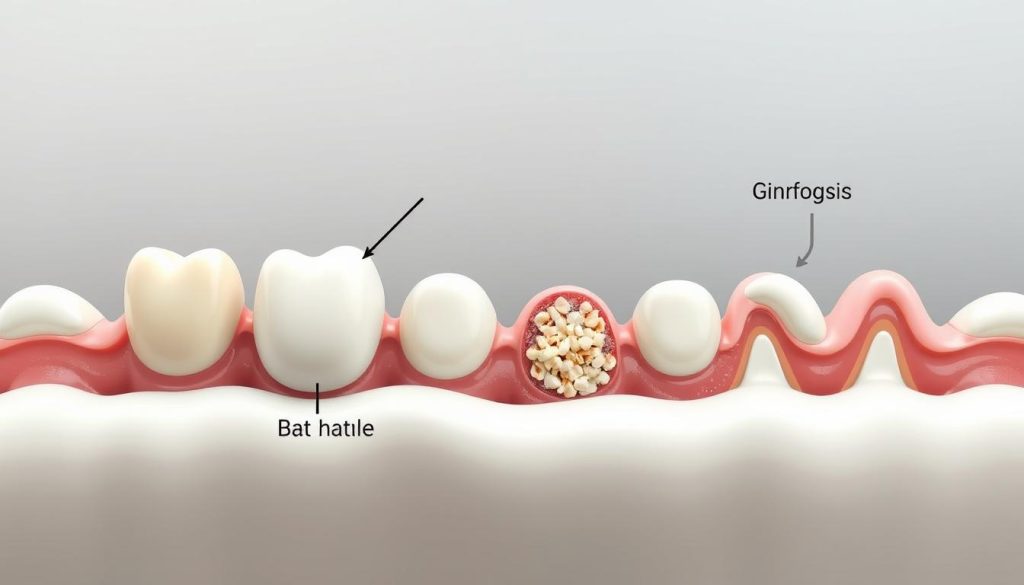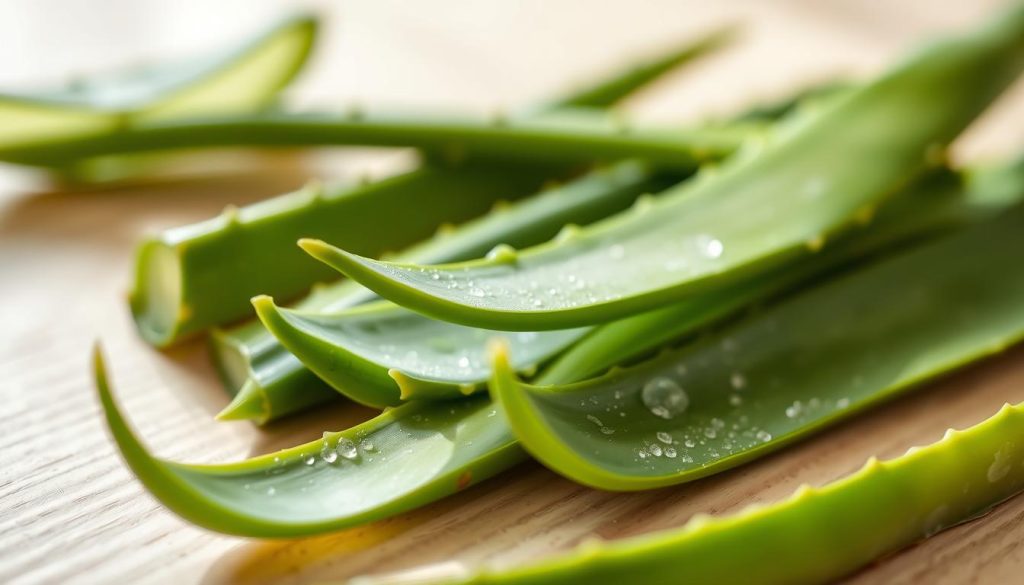Are you aware that unhealthy gums can lead to more than just a beautiful smile? Gum disease has been linked to various systemic health issues, making it crucial to maintain healthy gums. So, what’s the secret to achieving vibrant, healthy gums?
Nature has provided us with numerous natural remedies that can help. From simple oral hygiene practices to herbal treatments, there are many effective ways to improve gum health without relying on harsh chemicals.
By incorporating these natural treatments into your daily routine, you can say goodbye to gum problems and hello to a healthier, happier smile.
Key Takeaways
- Simple oral hygiene practices can significantly improve gum health.
- Herbal treatments offer a natural alternative to chemical-based products.
- A healthy diet plays a crucial role in maintaining gum wellness.
- Regular dental check-ups are essential for preventing gum disease.
- Natural remedies can be used in conjunction with traditional treatments.
Understanding Gum Health and Why It Matters
The state of your gums can significantly impact not just your oral health, but your overall health as well. Healthy gums are characterized by their firmness, pink color, and snug fit around the teeth. On the other hand, unhealthy gums may appear red, swollen, or bleed easily, indicating potential issues such as gingivitis or periodontitis.
Signs of Healthy vs. Unhealthy Gums
Recognizing the signs of healthy and unhealthy gums is the first step towards maintaining or achieving good oral health. Healthy gums do not bleed during brushing or flossing, whereas unhealthy gums may bleed, be painful, or show signs of recession. Here are some key differences:
- Healthy Gums: Firm, pink, and do not bleed easily.
- Unhealthy Gums: Red, swollen, may bleed during brushing or flossing.
The Connection Between Gum Health and Overall Wellness
Gum health is closely linked to overall wellness. Research has shown that there is a connection between gum disease and various systemic conditions, including heart disease, diabetes, and respiratory infections. As “The American Academy of Periodontology” states, maintaining healthy gums is crucial for preventing these conditions. Practicing good oral hygiene and using homemade remedies for healthy gums can significantly contribute to overall health.
By understanding the importance of gum health and recognizing its signs, individuals can take proactive steps towards maintaining healthy gums and, by extension, supporting their overall wellness.
Common Gum Problems and Their Causes
Gum health is a crucial aspect of our overall oral hygiene, and understanding common gum problems is essential for maintaining a healthy smile. Poor gum health can lead to various issues, including pain, discomfort, and even tooth loss. As Dr. Jane Smith, a renowned dentist, once said, “Gum disease is a silent killer, often showing no symptoms until it’s too late.”

Gingivitis and Periodontitis Explained
Gingivitis and periodontitis are two of the most common gum diseases. Gingivitis is the inflammation of the gums, typically caused by poor oral hygiene, leading to redness, swelling, and bleeding. If left untreated, gingivitis can progress to periodontitis, a more severe condition that damages the gums and bone supporting the teeth. According to the American Dental Association, periodontitis affects over 47% of adults in the United States.
Risk Factors Contributing to Gum Disease
Several risk factors contribute to the development of gum disease. These include:
- Poor oral hygiene habits
- Smoking and tobacco use
- Genetic predisposition
- Hormonal changes
- Certain medications
Being aware of these risk factors can help individuals take preventive measures to reduce their likelihood of developing gum disease.
When to See a Dentist vs. Using Home Remedies
While home remedies can provide relief for mild gum issues, it’s essential to know when to seek professional dental help. If you experience persistent pain, bleeding, or swelling, it’s time to consult a dentist. As
“The best way to prevent gum disease is through regular dental check-ups and good oral hygiene practices,”
says the American Academy of Periodontology.
In conclusion, understanding common gum problems and their causes is vital for maintaining healthy gums. By being aware of the risk factors and knowing when to seek professional help, individuals can take the necessary steps to prevent and treat gum disease effectively.
Effective Home Remedies for Gum Health
For those looking to enhance their gum health, several home remedies have proven to be highly effective. These natural treatments can help alleviate gum issues and promote overall oral health.
Salt Water Rinse: How to Prepare and Use
A salt water rinse is a simple yet effective remedy for reducing inflammation and killing bacteria in the mouth. To prepare, mix 1/2 teaspoon of salt with 8 ounces of warm water. Swish the solution around your mouth for 30 seconds before spitting it out. This remedy can be used 2-3 times a day, especially after meals.
Oil Pulling with Coconut Oil
Oil pulling with coconut oil is an ancient practice that involves swishing oil around the mouth to remove bacteria and reduce inflammation. Take 1 tablespoon of coconut oil and swish it around your mouth for 15-20 minutes. Be sure not to swallow the oil, as it will contain bacteria and toxins. After spitting it out, rinse your mouth with warm water.
Herbal Mouthwash Recipes
Herbal mouthwashes can be a great alternative to commercial products, allowing you to customize the ingredients to your needs. Some effective herbs for gum health include peppermint, chamomile, and sage. To make a simple herbal mouthwash, steep the herbs in hot water, then strain and cool the mixture before using it as a mouthwash.
Hydrogen Peroxide Solutions
Hydrogen peroxide is a common ingredient in many oral care products due to its antibacterial properties. To use hydrogen peroxide as a mouthwash, mix equal parts hydrogen peroxide and water. Swish the solution around your mouth for 30 seconds before spitting it out. Be cautious not to swallow the solution.
Some key home remedies for gum health include:
- Salt water rinse
- Oil pulling with coconut oil
- Herbal mouthwash recipes
- Hydrogen peroxide solutions
These remedies can be used in conjunction with regular brushing and flossing to promote healthy gums.
Natural Ingredients for Treating Gum Problems
Several natural ingredients have been found to be highly effective in treating gum issues. These ingredients offer a range of benefits, from anti-inflammatory properties to antibacterial effects, making them ideal for addressing various gum problems.
Aloe Vera Gel Applications
Aloe vera gel is renowned for its soothing and healing properties. It can be applied directly to the gums to reduce inflammation and promote healing. Aloe vera’s anti-inflammatory properties make it an excellent remedy for swollen gums.

Tea Tree Oil Treatments
Tea tree oil is known for its antibacterial properties, making it effective against the bacteria that cause gum disease. It can be used as a mouthwash by adding a few drops to water. However, it should be used with caution and in diluted form to avoid any adverse effects.
Turmeric Paste for Inflammation
Turmeric contains curcumin, which has potent anti-inflammatory and antioxidant properties. Making a paste with turmeric powder and applying it to the gums can help reduce inflammation and promote healthy gums.
Clove Oil for Pain and Infection
Clove oil has been used for centuries to relieve toothache and gum pain. Its antibacterial properties help combat infection, while its analgesic properties provide pain relief. Clove oil can be applied topically to the affected area using a cotton swab.
| Natural Ingredient | Benefits | Application |
|---|---|---|
| Aloe Vera Gel | Soothing, anti-inflammatory | Apply directly to gums |
| Tea Tree Oil | Antibacterial | Mouthwash (diluted) |
| Turmeric Paste | Anti-inflammatory, antioxidant | Apply as a paste to gums |
| Clove Oil | Analgesic, antibacterial | Apply topically with a cotton swab |
By incorporating these natural ingredients into your oral care routine, you can effectively treat and prevent gum problems, promoting overall gum health.
DIY Treatments for Specific Gum Conditions
Maintaining healthy gums can be achieved through various DIY treatments tailored to specific gum conditions. By understanding the cause of your gum issues, you can choose the most effective remedy.
Remedies for Swollen and Inflamed Gums
Swollen and inflamed gums can be painful and are often a sign of underlying infection. A salt water rinse can help reduce swelling and kill bacteria. Mix 1 teaspoon of salt in a cup of warm water and swish it around your mouth for 30 seconds before spitting it out.
- Aloe vera gel can also be applied directly to the affected area to soothe inflammation.
- Tea tree oil, known for its antibacterial properties, can be added to your oral care routine to combat infection.
Solutions for Bleeding Gums
Bleeding gums can be a sign of gingivitis or more severe gum disease. Oil pulling with coconut oil is a popular remedy that can help reduce bleeding by removing bacteria and reducing inflammation.
- Take 1 tablespoon of coconut oil and swish it around your mouth for 15-20 minutes.
- Spit it out and rinse your mouth with warm water.
Treatments for Receding Gums
Receding gums expose the roots of your teeth and can be sensitive. Using a desensitizing toothpaste can help alleviate sensitivity. Additionally, applying a turmeric paste to the affected area can help reduce inflammation and promote healing.
Addressing Bad Breath from Gum Issues
Bad breath can often be a result of gum problems. Using an herbal mouthwash that includes ingredients like peppermint, eucalyptus, or tea tree oil can help freshen breath and combat bacteria.
Preventative Measures and Daily Habits
Maintaining healthy gums requires a combination of good oral hygiene practices and smart lifestyle choices. By adopting the right daily habits, you can significantly reduce the risk of gum disease and promote overall oral health.
Proper Brushing and Flossing Techniques
Brushing and flossing are the cornerstones of good oral hygiene. To brush effectively, use a soft-bristled toothbrush and fluoride toothpaste, and gently brush along the gum line and all surfaces of your teeth. Flossing should be done at least once a day to remove food particles and plaque from between your teeth and under your gum line.
Nutrition and Foods for Optimal Gum Health
A diet rich in vitamins and minerals, particularly vitamin C and calcium, can help support gum health. Foods like leafy greens, citrus fruits, and dairy products are beneficial. Avoiding sugary and acidic foods can also help prevent gum disease.
Lifestyle Changes That Support Healthy Gums
Quitting smoking and managing stress are crucial for maintaining healthy gums. Smoking is a significant risk factor for gum disease, and stress can exacerbate oral health issues. Regular exercise and adequate sleep also contribute to overall health, including gum health.
Natural Gum-Friendly Toothpaste Alternatives
For those looking for alternatives to commercial toothpaste, natural options like toothpaste made with coconut oil, baking soda, and essential oils can be effective. These ingredients have antibacterial properties that can help maintain healthy gums.
| Nutrient | Benefit for Gum Health | Food Sources |
|---|---|---|
| Vitamin C | Boosts immune system, reduces inflammation | Citrus fruits, strawberries, bell peppers |
| Calcium | Strengthens teeth and bones | Dairy products, leafy greens, almonds |
| Omega-3 Fatty Acids | Reduces inflammation | Salmon, walnuts, chia seeds |

Conclusion: Maintaining Healthy Gums for Life
Maintaining healthy gums is crucial for a lifetime of vibrant smiles and overall wellness. By incorporating effective gum health remedies into your daily routine, you can prevent common gum problems and promote holistic gum health treatments.
Simple practices like salt water rinses, oil pulling, and using herbal mouthwashes can make a significant difference. Natural ingredients such as aloe vera gel, tea tree oil, and turmeric paste offer powerful solutions for treating gum issues.
By adopting these effective gum health remedies and maintaining good oral hygiene practices, you can enjoy healthy gums for life. Focus on proper brushing and flossing techniques, a balanced diet, and lifestyle changes that support gum health to keep your gums healthy and strong.
Maintaining healthy gums requires commitment, but the benefits are well worth the effort. With consistent care and attention, you can achieve a healthy, vibrant smile that lasts a lifetime.

Leave a Reply